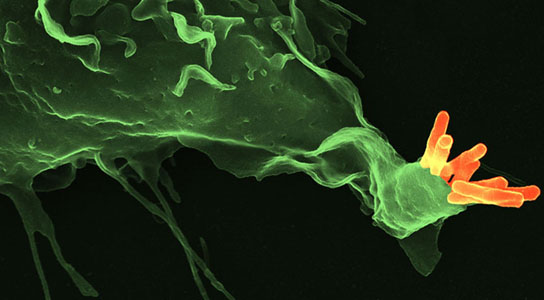
A phagocyte, a specialized white blood cell (green), is capturing and digesting tuberculosis bacteria (orange). Credit: Max Planck Institute
It’s hard to believe that the only tuberculosis vaccine currently available is over 90 years old. Since the BCG vaccine only protects young children, scientists realized the need for something new and improved and developed the VPM1002 vaccine, which is in Phase II trials. The belief is that a new vaccine could prevent millions of tuberculosis-related deaths.
The only tuberculosis vaccine currently available is already over 90 years old – and is unsatisfactory in terms of its effectiveness. Although it protects young children against developing tuberculosis, it quickly loses its effectiveness and does not protect young people and adults against the infection. Scientists from the Max Planck Institute for Infection Biology in Berlin have now developed an improved vaccine that has been undergoing clinical trials on humans since 2008. The safety and tolerability of the vaccine candidate is being tested in a Phase II trial on infants in South Africa. The results of the preceding Phase I trial have already shown that the vaccine candidate fulfills the relevant safety requirements and that its mechanism of action works.
Scientists have been working on an improved vaccine against the tuberculosis bacterium Mycobacterium tuberculosis for almost 90 years. The Bacillus Calmette-Guérin vaccine (BCG) was developed in the early 20th century and contains attenuated Mycobacterium bovis bacteria, the bovine tuberculosis pathogen that is transmissible to humans. BCG vaccination protects children in most cases against the disease, but not adults. Therefore, the vaccine has not contributed to reducing the global incidence of tuberculosis.
The VPM1002 vaccine, which was developed at the Max Planck Institute for Infection Biology, is based on the BCG vaccine and contains genetically modified Mycobacterium bovis bacteria. A built-in gene makes it easier for the immune cells to recognize the bacteria; the organism can thus protect itself against actual infection with dangerous tuberculosis pathogens. “VPM1002 is intended to replace the current BCG vaccine and will be administered to young children to protect them against tuberculosis. However, adults may also be able to benefit from it later,” says Stefan Kaufmann from the Berlin-based Max Planck Institute.
The vaccine candidate has been undergoing Phase II trials since November 2011. These should establish whether it is safe and tolerable for infants in regions with a high incidence of tuberculosis. A total of 48 infants are being immunized. No side effects have emerged to date.
VPM1002 was licensed to Vakzine Projekt Management GmbH in Hanover, which carried out its entire pre-clinical development. The vaccine was initially tested on healthy volunteers in Germany under the name VPM1002 in autumn 2008. The safety profile of an active substance is tested in a Phase I trial. The vaccine passed this test with flying colors. No side effects arose in the course of this study. The next thing the researchers must ensure is that VPM1002 is also safe and works as planned in individuals who live in regions with a high incidence of tuberculosis. “The Phase Ib study shows that VPM1002 also fulfills this requirement,” says Bernd Eisele from Vakzine Projekt Management, which is responsible for the implementation of the vaccine trials.
Before VPM1002 can be introduced to the market as a vaccine, its effectiveness and safety must be confirmed in further studies on volunteers in areas with a high risk of tuberculosis. “If everything goes well and VPM1002 also proves effective and safe in large-scale international studies, the new vaccine could be ready for use in around four years’ time,” hopes Stefan Kaufmann.
In addition to VPM1002, eleven other tuberculosis vaccine candidates are currently undergoing clinical development. VPM1002 is the only one of three genetically modified variants of the current BCG vaccine that is undergoing further development in clinical trials. Two of the other candidates, which are based on a virus carrier with Mycobacterium tuberculosis antigens, are currently undergoing Phase IIb trials. The first of these vaccines could be available for use in 2016 at the earliest.
Experts estimate that a vaccine that improves on the BCG could prevent almost 8 million deaths from tuberculosis. A new booster vaccine could reduce the number of tuberculosis victims by a further 40 percent.









I hope VPM1002 vaccine will success. Im ready to participate as a volunteer because im already cured from tb